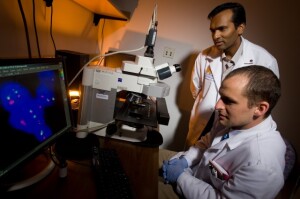
Research team at Michigan
Center for Translational
Pathology at the Univ. of
Michigan Health System
Researchers led by a team at the Michigan Center for Translational Pathology at the University of Michigan Health System have identified traits of an aggressive type of prostate cancer that occurs in about 10 percent of men who have the disease. They hope the discovery could lead, possibly within the next few years, to a simple urine test that will help to diagnose this variation of prostate cancer.
Previous studies by this group of researchers have shown that most prostate cancer is caused in part by a gene fusion -- the merging of two unrelated genes, which plays a role in at least 50 percent of prostate cancer cases.
To shed light on the prostate cancers that don't form this way, researchers in the current study analyzed data on 1,800 prostate cancers to find commonalities in their genetic aberrations. They learned that a gene called SPINK1 (serine peptidase inhibitor, Kazal type 1) was over-expressed, or found in excess amounts, in prostate cancers that do not have gene fusions. The finding suggests that SPINK1 is a biomarker -- a molecule in bodily fluids, blood and tissue that can be a signal of a disease -- for a subtype of prostate cancer.



Ad Statistics
Times Displayed: 77597
Times Visited: 2716 Ampronix, a Top Master Distributor for Sony Medical, provides Sales, Service & Exchanges for Sony Surgical Displays, Printers, & More. Rely on Us for Expert Support Tailored to Your Needs. Email info@ampronix.com or Call 949-273-8000 for Premier Pricing.
The findings, reported in the June issue of the journal Cancer Cell, also suggest that men with SPINK1-related prostate cancers tend to have a quicker recurrence of the disease than those with other types of prostate cancer.
"Our study is really the first to look at what is happening molecularly with fusion-negative prostate cancers," says Scott Tomlins, Ph.D., first author of the paper and an M.D./Ph.D. student at the U-M Medical School.
"Because SPINK1 can be found non-invasively in urine, a test could be developed that would complement current urine testing that is used to detect some prostate cancer or future urine tests for gene fusions," adds senior author Arul Chinnaiyan, M.D., Ph.D., director of the Michigan Center for Translational Pathology and S.P. Hicks Endowed Professor of Pathology at the U-M Medical School.
An estimated 186,320 new cases of prostate cancer will be diagnosed this year, according to the National Cancer Institute, and more than 28,000 men will die from the disease this year. More than 70 percent of men diagnosed with prostate cancer are older than 65.
Current tests for prostate cancer include blood tests. Increased levels of PSA can indicate that prostate cancer is present. Another test is a digital rectal examination, which can detect abnormalities in the prostate. Another urine-based test screens for PCA3 as a specific biomarker of prostate cancer.

